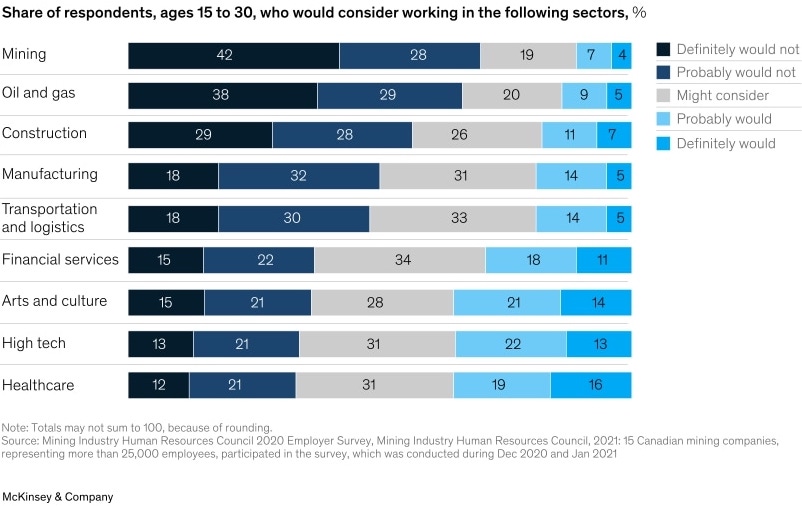5 misconceptions about a career in mining
…and why it could be an attractive career choice for you
The mining industry has been long regarded as a dirty and dangerous industry, and this perception has contributed to the industry’s difficulty in attracting and retaining talent.
However, with the adoption of new technologies and data-driven approaches, the mining industry has undergone a significant transformation in recent years. Moreover, it offers a wide range of job opportunities that require specialised skills and knowledge.
In this blog, we debunk some common misconceptions about the mining industry, and talk about why you should consider a career in mining.
# 1 Misconception: Mining is a dirty industry
One of the main reasons why mining is not considered an attractive career choice, is due to its perception as a dirty industry. This misconception largely stems from the environmental impact of mining activities, which can include soil and water pollution, deforestation, and habitat destruction. Additionally, the use of heavy machinery and equipment can produce dust and noise pollution, which can affect the health and safety of workers.
Reality: Mining is an environmentally and socially conscious industry
While the mining industry has historically been associated with negative environmental impact and safety concerns, it is important to note that the industry has undergone a significant transformation in recent years. The use of data and technology, such as autonomous mining equipment, artificial intelligence, and machine learning has revolutionised the way mining operations are conducted, making it an efficient and safe industry to work in.
Furthermore, it’s important to note that following mine closure, reclamation is carried out, the goal of which is to restore the site’s natural ecosystem and promote the growth of vegetation that is suitable for the local climate and soil conditions. This involves a wide range of activities, from soil stabilisation and grading, to planting vegetation. In addition, mine reclamation efforts can also include the construction of new wetlands, ponds, and other water features that provide habitat for wildlife and help mitigate the impacts of mining on local water resources.
# 2 Misconception: Mining jobs are physically demanding and dangerous
Another reason why the mining industry is not considered an attractive career choice is the perception that mining jobs are physically demanding and often dangerous. The use of heavy machinery and equipment, combined with the harsh working conditions, can lead to accidents and injuries.
Reality: Mining is a high-tech, data-driven industry that requires specialised skills
While it is true that mining jobs can be challenging, digital transformation and the adoption of new technologies has made mining much safer and less physically demanding. Additionally, mining jobs require specialised skills and training, making them a high-tech and sophisticated industry.
The use of data and technology has created new job opportunities, such as data analysts, software developers, and automation engineers, which require specialised skills and knowledge. Furthermore, with the push for autonomous self-driving trucks, you don’t need to work for Tesla to work with self-driving vehicles. Many mines now use off-road driverless trucks and remote control equipment.
#3 Misconception: Mining is a dead-end industry
One common misconception about the mining industry is that it is a dead-end industry with limited growth potential. This potentially stems from the belief that the industry is outdated, environmentally harmful and socially unjust.
Reality: The mining industry is booming and is required for future sustainable development
With the increasing demand for minerals and metals required for sustainable development, such as electric vehicles, wind turbines, and solar panels, the industry is becoming more important than ever. For example, Tesla has recently announced their plans to open a new mine to provide lithium, a key component for electric vehicle batteries, to his supply chain. This move not only highlights the growing importance of the mining industry in sustainable development but also emphasises the need for responsible sourcing practices.
As a result of this increase in demand, the industry is expected to grow, creating more job opportunities in various sectors such as geology, mining engineering, environmental management, and renewable energy. By embracing sustainability and responsible sourcing practices, the mining industry has the potential to not only contribute to a more sustainable future but also provide fulfilling and lucrative career opportunities for those interested in the industry.
# 4 Misconception: All mining jobs require relocation and work in undesirable areas
People are often put off venturing into the industry due to the perceived requirements of having to work in remote and often undesirable locations.
Reality: New technologies are allowing for more remote working possibilities
While it is true that a lot of mines are located in remote areas, requirements to always be on-site have since shifted. The reality is that the industry is rapidly evolving, and new technologies are allowing for more centralised hubs in big cities. With the rise of remote working and the adoption of digital technologies, many mining companies are now leveraging digital platforms to enable workers to work from anywhere. In addition, mining companies are investing in centralised hubs, where employees can work in state-of-the-art facilities that have access to all the necessary resources and technologies, while still being close to urban amenities.

Some places the MTS team visited recently
#5 Misconception: Mining is unethical, laws are often broken and workers are exploited
It is a common misconception that the mining industry is associated with unethical practices such as the exploitation of workers, conflict minerals, and environmental degradation.
Reality: The industry is in fact heavily regulated with stringent laws
While there have been instances of unethical behaviour in the mining industry, it is important to recognize that these are not representative of the industry as a whole. The reality is that the mining industry is highly regulated, with stringent laws and regulations in place to ensure responsible mining practices. Many countries have implemented laws that require mining companies to adhere to strict environmental, social, and governance standards. Many companies also impose their own regulations which often go above and beyond local requirements. Moreover, companies that engage in unethical practices can face significant penalties and reputational damage.
The majority of mining companies are committed to responsible mining practices and work diligently to minimise the environmental impact of their operations while ensuring the safety and well-being of their employees.
Despite the misconceptions surrounding the mining industry, it is a critical industry that plays a significant role in the global economy. The adoption of new technologies and data-driven approaches have made the mining industry more efficient, safer, and sustainable, while offering a wide range of job opportunities, from entry-level positions to high-tech roles requiring specialised skills and knowledge.


